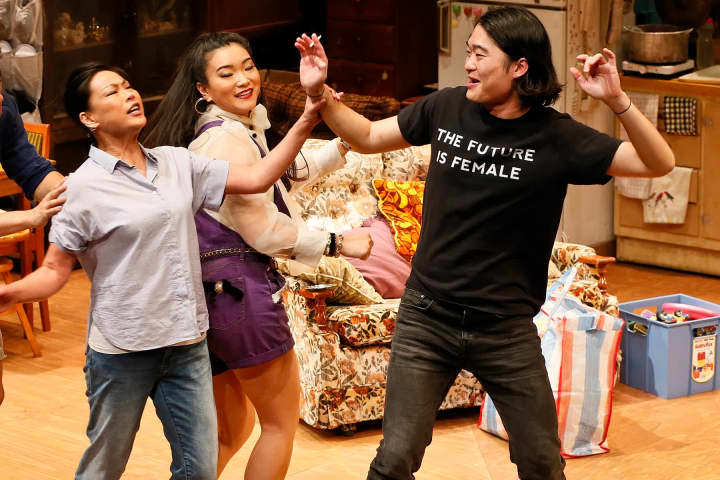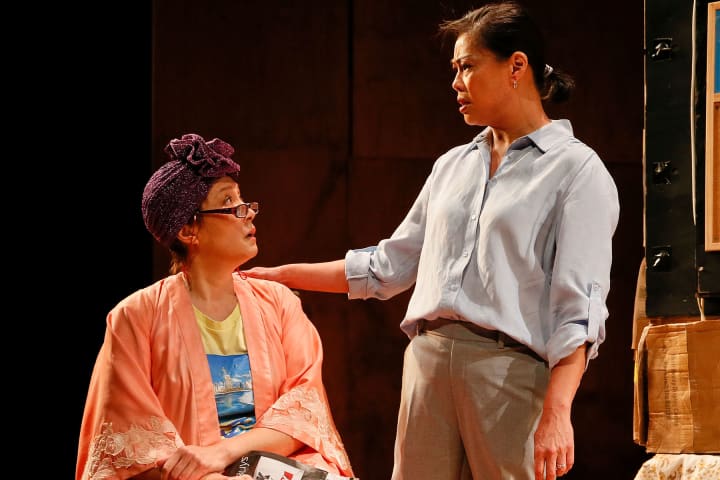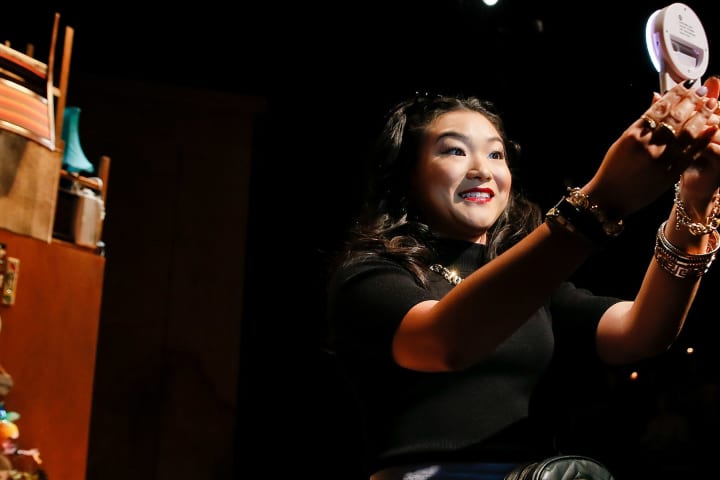Laura Wade talks to MTC about her Olivier Award-winning comedic play about a couple living the perfect 50s life … or is it a perfect 50s lie?
Laura Wade has long been fascinated by folk she dubs ‘vintage people’. A nostalgia for simpler times (notwithstanding the sexism that came with it) got her thinking about how housework is divided between the sexes in the present day. Whether we acknowledge it or not, domestic chores are often still gendered activities. Wade is not only interested in looking at how far, or not, we have come, but if the Vaseline-coated lens we apply to the Mad Men-era could inspire a complete lifestyle transformation; if a couple decided to live now, as it was then. Wade put pen to paper and created Home, I’m Darling.
She wrote the play in her shed, a small dwelling at the bottom of her garden with scarcely enough room for visitors to linger for more than a quick chat. As a writer, she is familiar with long hours spent dreaming in isolation. In that, she’s a little like Judy, her protagonist in Home, I’m Darling – a woman obsessed with 1950s fashion and interior décor, who is as committed to her home as she is to her husband.

Nikki Shiels in rehearsal, with Laura Wade's script. Photo: Pia Johnson
A feminist time-warp wife?
To crawl inside Judy’s mind, Wade worked out exactly what she would have done each day, which extended to deep cleaning a minimum of two rooms on a never-ending rotation. ‘I can’t say I do an awful lot of housework myself,’ she admits. ‘But I do retreat inside my shed to write, so I understand the idea of wanting to stay at home. I also like cooking, so I get the desire to feed people.’
‘There are different flavours of feminism. And Judy genuinely believes she is a feminist.’
When you break it down, there is a simple endeavour at the heart of Judy’s plight: to create things for the people she loves, instead of being a nebulous cog in the wheel of a faceless organisation. ‘When you think about it like that, it does make sense,’ Wade acknowledges. Yet many would consider eschewing employment to play house inherently anti-feminist. ‘In our society, it feels quite shocking,’ she says. Wade wanted to interrogate this thinking and flip it on its head a little. ‘It’s important not to judge her,’ she clarifies. ‘There are different flavours of feminism. And Judy genuinely believes she is a feminist. So it felt like there was a space for discussing some of these questions inside that milieu.’
#MeToo vs nostalgia
At the start of 2013, when Wade began drafting this narrative, the sleazy subplot of the character Marcus was well ahead of the #metoo movement. ‘By the time the play premiered, it sort of felt like we were jumping on the band wagon,’ she remembers. But fortunately for Wade and her creative team, the microscopic dissection of current-day gender politics, both inside and outside the home, has never felt more laser-focused and topical. ‘People are mobilising a lot today. I think there was a real complacency earlier in the century where people thought, “Yes, equality has been achieved and everything is fine now,” before re-evaluating and saying, “Well, actually it hasn’t.” I think these things go in waves.’
Most generations have an element of being horribly ungrateful children, Wade believes. We’re always rebelling, in some sense, from what has come before us, which is very much the case with Judy. ‘But it felt like there needed to be someone in the play to say, firstly, “this is weird”, and secondly, “it’s pretty disrespectful to the history that has come before.” That person is [Judy’s mother] Sylvia.’

Nikki Shiels as Judy and Jane Turner as Sylvia in rehearsal. Photo: Pia Johnson
Breeding creativity
At 38, Judy’s lack of children required explaining early in the piece. ‘It’s one of those things you have to acknowledge so the audience can stop thinking about it,’ Wade says earnestly. People are obsessed with whether a woman has children or not, she explains. Men never get the same level of inquiry when it comes to family configuration. ‘People want to know “Why doesn’t she have children? Does she want children? Was there a problem? Is all of this a way of taping over the cracks in their marriage because they haven’t been able to have children? Or has she lost children?”’ For the play to work, Wade says the purity of Judy’s choice to be a full-time housewife meant she couldn’t be a mother as well.
Over the six-year evolution of the play, Wade, her director Tamara Harvey and their original actor, Katherine Parkinson – for whom the part of Judy was written – individually took time away from their work to have two children each. It’s a bizarre coincidence, Wade acknowledges, but somehow this trio of prominent female artists managed to create an award-winning play in the process. ‘The work benefitted from that long gestation … there’s a clarity that comes with that.’
‘There’s nothing not nice about winning an Olivier Award … it’s one hundred per cent lovely.’
Collecting the 2019 Laurence Olivier Award for Best New Comedy came as a total surprise to Wade. ‘I was not expecting it at all,’ she says. ‘There’s nothing not nice about winning an Olivier Award … it’s one hundred per cent lovely.’ Soon after the play closed on the West End, the production toured back to Flintshire in Wales, where it had premiered at Theatr Clwyd. ‘It felt like we brought the show home. And on our last night, the very last night of the show, I took the Award to pass it around, because it belonged to everyone. We all had ownership of the play’s success. It meant a huge amount to that theatre.’
See Home, I’m Darling at Southbank Theatre, The Sumner from 20 January, supported by Production Partner Little Group.
Published on 18 December 2019





